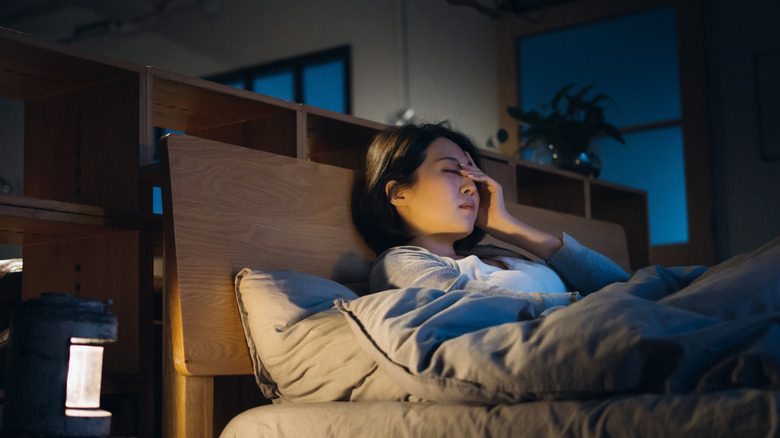Signs You Might Be Low On Estrogen
Although estrogen plays an important role in every body, the hormone is most critical for people with a female reproductive system. Throughout the evolution of the body, estrogen is there, producing breasts and curves as the body advances. It also aids in menstruation, menopause, and the pregnancy process. Outside of estrogen's role in the reproductive process, the sex hormone affects brain function, blood sugar and cholesterol levels, bone and muscle mass, and circulation.
Throughout your menstrual cycle, estrogen and progesterone levels rise and lower in the body. At their lowest, they cause tiredness — it's why your period schedule can inspire your workout routine. Estrogen levels also rise and fall during every stage of life. However, when you reach the age of 50, your estrogen levels may decrease by about 50%, going further down as you go deeper into menopause.
During your 20s, your estrogen levels will peak. This is when different health functions relating to estrogen, such as brain function, collagen production, blood flow, and blood sugar levels, typically perform at their best. If you start to notice decreases in these specific areas, as well as lower energy levels, you may have low estrogen.
What are some signs of low estrogen?
Signs of low estrogen levels are often consistent with some symptoms of both PCOS — polycystic ovarian syndrome — and menopause. Painful sex, hot flashes, excessive sweating at night, changing moods, irregular periods, tender breasts, difficulty with concentration, and fatigue are all common symptoms of low estrogen levels. While there are commonalities between the signs of low estrogen and those of PCOS and menopause, experiencing these things doesn't mean that you're experiencing either of those.
You may also find that your bones easily fracture, as the hormone helps to strengthen bones. As you inch closer to middle age, it's normal for your estrogen levels to begin to decrease. Yet there are certain habits and underlying health issues that may lead to a rapid decline. Body fat is vital when pertaining to the production of sex hormones. Doing things that diminish all of your body fat, like exercising too rigorously or depriving yourself of food, can result in low estrogen levels.
Kidneys are also important in the production of various hormones. When they're not functioning properly or if you have some type of chronic kidney disease, estrogen levels are likely to take a dip. Other disorders, like Turner syndrome or a poorly functioning pituitary gland, can decrease estrogen levels.
How can you increase your estrogen levels?
If you find that you're experiencing common symptoms of low estrogen levels, speak to your doctor or gynecologist to obtain a proper diagnosis. For levels that are dipping a bit too low, there are common lifestyle changes you can make to increase estrogen production. Your diet can play a large role in getting your estrogen levels up. Foods like apples, grapes, spinach, carrots, almonds, pistachios, edamame, tofu, chickpeas, quinoa, and barley can help with low estrogen.
Getting enough rest is also crucial for your estrogen levels. When you're awake through the night, your cortisol levels rise in the morning, which doesn't give room for your estrogen levels to be balanced. Try practicing the quarter-hour rule to fall and stay asleep. You can also take vitamins that help out with estrogen production, such as boron and vitamins B and D.
In more severe cases, you may find that your doctor will put you on treatment plans to increase the estrogen levels in your body. Treatments like hormone replacement therapy can help you achieve more balanced levels. While these therapy treatments are not without their side effects — including weight fluctuations, diarrhea, and an upset stomach, for example — they can be vital in helping you lead a healthy life.


